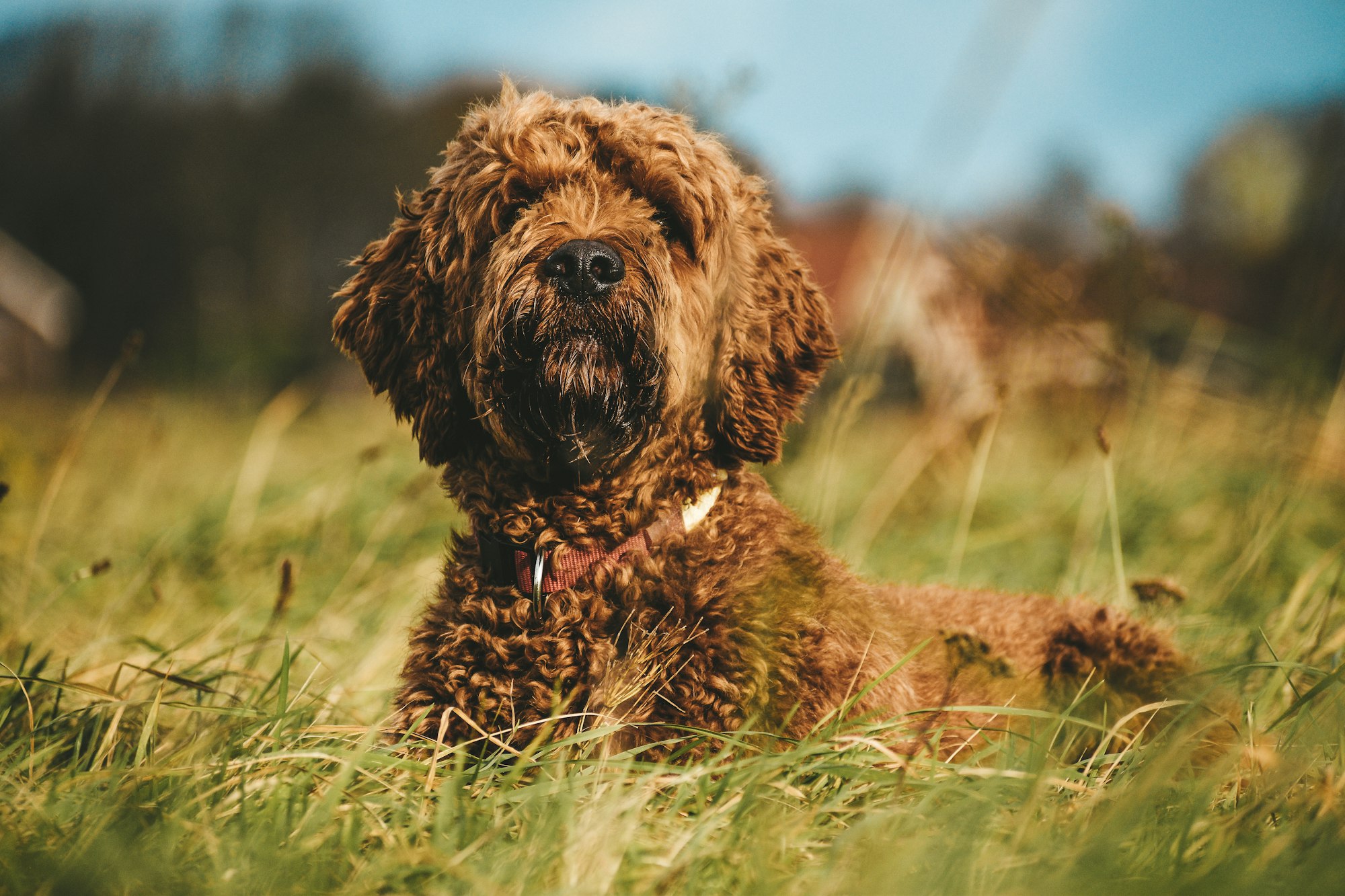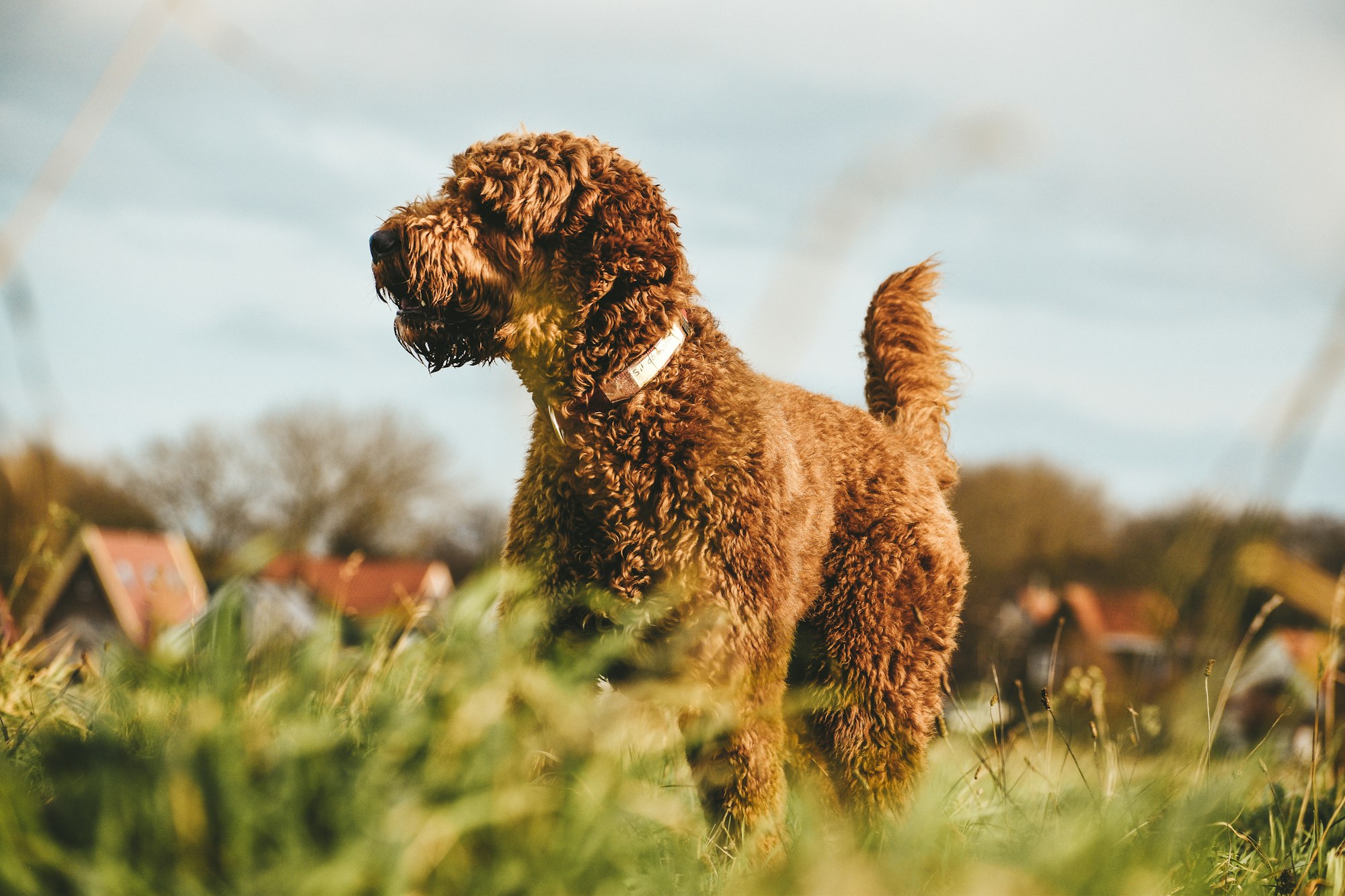If you're a dog lover, you've probably heard of many hybrid breeds, such as the Labradoodle, Cockapoo, and Goldendoodle. But have you ever heard of the Irish Doodle? This charming breed is a cross between the Irish Setter and the Poodle, resulting in a dog that is not only cute but also intelligent and loyal.
In this article, we'll dive into the fascinating world of the Irish Doodles breed, exploring everything from their history and characteristics to their temperament and training.
A Brief History of Irish Doodles
Before we delve into the details of this adorable breed, let's take a brief look at their history. Irish Doodles are a relatively new breed, developed in the United States in the 1990s. They are a cross between the Irish Setter, a beloved hunting dog originally from Ireland, and the Poodle, a popular breed known for its hypoallergenic coat and intelligence. The breed quickly gained popularity and is now recognized by several dog organizations.

Physical Characteristics of Irish Doodles
Irish Doodles are medium-sized dogs, weighing between 40 and 70 pounds and standing at around 24 inches tall. They have a soft, curly coat that is typically a mix of brown, black, cream, red, and white. Due to their Poodle ancestry, they are often hypoallergenic and shed less than other breeds. The Irish Doodle's eyes are usually brown or hazel.
Irish Doodles can have a variety of eye colors, including brown, amber, green, or blue. The exact color of an Irish Doodle's eyes can be difficult to predict, as it can depend on the individual dog's genetics and the colors of their parents. Additionally, an Irish Doodle's eye color may change as they grow older.
Irish Doodles typically have long, floppy ears that hang down, which is a trait inherited from their parent breeds, the Irish Setter and the Poodle. The exact shape and size of an Irish Doodle's ears can vary depending on the individual dog, but they are generally medium to large and covered in soft, curly, or wavy hair. Some Irish Doodles may have straighter hair on their ears if they inherit more of the Poodle's characteristics.
Temperament and Personality
Irish Doodles are known for their friendly, outgoing, and affectionate temperament. They are social dogs who enjoy spending time with their family and are known for being good with children and other pets.
As a crossbreed, the temperament of an Irish Doodle can vary depending on the characteristics inherited from each parent breed. However, Irish Doodles are generally intelligent and eager to please, which makes them responsive to training.
They have a moderate energy level and require daily exercise and mental stimulation to prevent boredom and destructive behavior. Irish Doodles are also known for their playful nature and enjoy games and activities that involve interaction with their owners.
While Irish Doodles are generally good-natured, it's important to socialize them from an early age to prevent any shyness or aggression towards strangers or other animals.
Overall, the Irish Doodle is a loving and loyal companion who thrives on human interaction and makes an excellent addition to an active and affectionate family. They are easy to train, making them suitable for first-time dog owners.
Training and Exercise
Like most breeds, Irish Doodles require regular exercise and training to keep them active and healthy. They are highly intelligent and respond well to positive reinforcement training methods. They enjoy learning new tricks and commands and can excel in activities such as agility and obedience. Daily walks and playtime in the yard are recommended to keep them stimulated and happy.
They are typically high-energy dogs that enjoy activities such as hiking, running, and playing fetch. It's recommended that Irish Doodles get at least 30-60 minutes of exercise per day.
Training is also important for Irish Doodles, as they can be independent and stubborn at times. Positive reinforcement techniques such as rewards and praise are generally effective with this breed, and early socialization and training can help prevent behavioral problems in the future.
It's important to note that Irish Doodles may have a strong prey drive, so they should always be supervised when off-leash and socialized with other animals from a young age. Additionally, because of their Poodle heritage, Irish Doodles may be prone to anxiety and may benefit from crate training and a structured routine.

Grooming and Care of the Irish Doodle
The Irish Doodle requires regular grooming to keep its coat healthy and shiny. It is necessary to brush their coat at least twice a week to prevent matting and tangling. They also need regular baths to keep their coat clean and free from dirt and debris.
Because of their Poodle heritage, Irish Doodles may require professional grooming haircuts every few months to maintain their coat's shape and prevent matting. Additionally, regular trimming of the hair around their eyes and ears can help prevent irritation and infection.
Irish Doodles are also prone to ear infections, so it is essential to clean their ears regularly to prevent any infections from developing.
They also require regular nail trimming. Nail trimming is a noteworthy part of Irish Doodle grooming and care. Overgrown nails can cause discomfort and even lead to health issues, so it's recommended to trim an Irish Doodle's nails every 4-6 weeks.
It's important to use proper technique when trimming an Irish Doodle's nails to avoid cutting the quick, which is the blood vessel inside the nail. Cutting quickly can be painful and cause bleeding. If you're not confident in your ability to trim your dog's nails, it's best to seek the assistance of a professional groomer or veterinarian. Or you can introduce a scratch board and see if your dog will take to that.
Before trimming your Irish Doodle's nails, it's necessary to gather the necessary supplies, including nail clippers designed for dogs and styptic powder in case you accidentally cut the quick. You should also familiarize yourself with the anatomy of the nail and where the quick is located.
To trim your Irish Doodle's nails, hold their paw firmly but gently, and use the clippers to trim off the tip of the nail. Avoid cutting too close to the quick, which may be visible as a pink area inside the nail. If you accidentally cut quicklyand bleeding occurs, apply styptic powder to the affected area to stop the bleeding.
Remember to reward your Irish Doodle with treats and praise for good behavior during the nail-trimming process, and take breaks as needed to avoid causing stress or discomfort.
Irish Doodles also require regular dental care, such as teeth brushing and dental chews, to prevent tooth decay and gum disease. Their nails should be trimmed regularly to prevent overgrowth, which can be uncomfortable and lead to health issues.
In terms of care, Irish Doodles should have access to clean water and a balanced diet to maintain their overall health. Regular exercises and mental stimulation, such as puzzle toys and training sessions, can also help keep them happy and healthy. It's important to schedule regular check-ups with a veterinarian to ensure their health needs are being met.

Health Concerns of the Irish Doodle
As with any breed, Irish Doodles are prone to certain health conditions. Some of the health issues that may affect Irish Doodles include:
- Hip Dysplasia: This is a condition in which the hip joint doesn't form properly, which can cause pain and mobility issues.
- Progressive Retinal Atrophy (PRA): This is a degenerative eye condition that can lead to blindness.
- Ear Infections: Because of their floppy ears, Irish Doodles may be prone to ear infections.
- Addison's Disease: This is a hormonal disorder that can cause weakness, lethargy, and other symptoms.
- Sebaceous Adenitis: This is a skin condition that can cause hair loss and other skin problems.
- Bloat: This is a condition in which the stomach fills with gas and twists, which can be life-threatening.
It's important to work with a reputable breeder who screens their breeding dogs for these and other health issues. Additionally, regular veterinary check-ups and preventive care can help detect and treat any health issues early. Providing your Irish Doodle with a healthy diet, regular exercise, and proper grooming and care can also help prevent health problems from developing.
Choosing an Irish Doodle
When choosing an Irish Doodle, there are several factors to consider to ensure that you find a healthy and well-socialized puppy:
- Find a reputable breeder: Look for a breeder who is knowledgeable about the breed and screens their breeding dogs for genetic health issues. A reputable breeder should also be willing to show you where the puppies are raised and allow you to meet the puppy's parents.
- Consider the puppy's temperament: While the temperament of a puppy can change as they grow and develop, it's important to observe the puppy's behavior and interaction with people and other animals. Look for a puppy that is friendly, curious, and comfortable with handling.
- Look for a healthy puppy: Make sure the puppy you choose has a shiny coat, clear eyes, and is active and playful. Avoid puppies that seem lethargic, have discharge from their eyes or nose, or show signs of illness.
- Ask about socialization: A well-socialized puppy should have had positive experiences with a variety of people, animals, and environments. Ask the breeder about the puppy's socialization and ask to see any documentation, such as vaccination records and health certificates.
- Consider your lifestyle: Irish Doodles are a fairly active breed and require daily exercise and mental stimulation. Make sure you have the time and resources to provide your puppy with the exercise and training they need to thrive.
Choosing the right Irish Doodle puppy can take time and research, but finding a healthy and well-socialized puppy can ensure a happy and fulfilling life with your new furry friend.

Irish Doodles and Children
Irish Doodles are great with children and can make excellent family pets. They are playful and energetic, and they enjoy spending time with their human family members. However, as with any breed, it's important to supervise interactions between young children and dogs to ensure everyone stays safe.
Frequently Asked Questions (FAQs)
How much exercise do Irish Doodles need?
Answer: Irish Doodles need at least 30 minutes of exercise each day, but they will enjoy more if possible.
Are Irish Doodles hypoallergenic?
Answer: Irish Doodles are often hypoallergenic, but this can vary depending on the individual dog's coat.
Are Irish Doodles good with other pets?
Answer: Irish Doodles can be good with other pets, but socialization from an early age is critical to ensure they get along well with other animals.
How often do Irish Doodles need to be groomed?
Answer: Irish Doodles require regular grooming, including brushing their coat a few times a week and bathing every few months.
Are Irish Doodles easy to train?
Answer: Irish Doodles are intelligent and respond well to positive reinforcement training methods, so they can be relatively easy to train with consistency and patience.
Are Irish Doodles recognized by major kennel clubs?
Answer: No, Irish Doodles are not currently recognized as a breed by major kennel clubs, as they are a relatively new breed. However, many breeders are working to establish consistent traits and standards for the breed.
What size do Irish Doodles typically grow to be?
Answer: Irish Doodles can vary in size depending on their Poodle parent, but they generally range from medium to large, weighing between 40 and 70 pounds and standing 20 to 28 inches tall.
Are Irish Doodles good with children?
Answer: Yes, Irish Doodles are generally good with children, as they are affectionate and playful. However, as with any dog, it's important to supervise interactions between children and dogs to prevent accidents.
Conclusion
In conclusion, the Irish Doodle is a friendly, sociable, and intelligent breed that makes an excellent family pet. They are easy to train and require regular grooming and exercise to keep them healthy and happy. If you are looking for a hypoallergenic dog that is great with children and easy to care for, then the Irish Doodle may be the perfect breed for you.
Get more expert advice on pet-parenting by visiting the Off Leash blog at TryFi.com.
TryFi's The Fi Dog Collar is a must-have for any pet parent, it's a GPS tracking collar that helps you keep tabs on your dog's location, activity, and sleep patterns, and alerts you if they escape your backyard. Try the Fi Dog Collar today!

